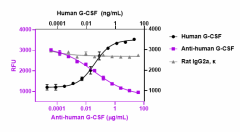- Clone
- W20129F (See other available formats)
- Regulatory Status
- RUO
- Other Names
- Granulocyte-Colony Stimulating Factor, CSF3, CSF-β, Pluripoietin, Lenograstim, Filgrastim
- Isotype
- Rat IgG2a, κ

-

Recombinant human G-CSF (Cat. No. 578602) (black circles) induces proliferation of M-NFS-60 cells. Ultra-LEAF™ purified anti-human G-CSF (clone W20129F) (purple squares) neutralizes M-NFS-60 cell proliferation induced by recombinant human G-CSF at 0.2 ng/mL in a dose-dependent manner, whereas the Ultra-LEAF™ purified rat IgG2a, κ isotype control (Cat. No. 400544) (gray triangles) does not have this effect. ND50 range is 0.08 - 1.0 µg/mL.
| Cat # | Size | Price | Quantity Check Availability | ||
|---|---|---|---|---|---|
| 619953 | 100 µg | $430.00 | |||
| 619954 | 1 mg | $1205.00 | |||
Select size of product is eligible for a 40% discount! Promotion valid until December 31, 2024. Exclusions apply. To view full promotion terms and conditions or to contact your local BioLegend representative to receive a quote, visit our webpage.
Human G-CSF was cloned from a human squamous carcinoma cell line and is the key hematopoietic cytokine involved in the control of neutrophil production. Therefore, it is a critical regulator of innate immunity against bacterial infections. G-CSF mobilizes stem cells indirectly by down-regulating the expression of CXCL12 on marrow osteoblasts and by releasing neutrophil and monocyte proteolytic enzymes, including neutrophil elastase, cathepsin G, and matrix metalloproteinase-9, which in turn degrade important HSC trafficking and adhesion molecules c-kit, VCAM-1, and CXCR4. In addition, G-CSF possesses immunosuppressive effects on monocytes/macrophages, dendritic cells, and T lymphocytes. The receptor for G-CSF is expressed not only in hematopoietic cells, it is also expressed in cardiomyocytes, skeletal muscle, and neurons. G-CSF influences mouse skeletal muscle development and regeneration by stimulating myoblast proliferation. In vitro, G-CSF displays strong antiapoptotic activity in neuronal cells.
Product Details
- Verified Reactivity
- Human
- Antibody Type
- Monoclonal
- Host Species
- Rat
- Immunogen
- Recombinant human G-CSF
- Formulation
- 0.2 µm filtered in phosphate-buffered solution, pH 7.2, containing no preservative.
- Preparation
- The Ultra-LEAF™ (Low Endotoxin, Azide-Free) antibody was purified by affinity chromatography.
- Concentration
- The antibody is bottled at the concentration indicated on the vial, typically between 2 mg/mL and 3 mg/mL. To obtain lot-specific concentration and expiration, please enter the lot number in our Certificate of Analysis online tool.
- Storage & Handling
- The antibody solution should be stored undiluted between 2°C and 8°C. This Ultra-LEAF™ solution contains no preservative; handle under aseptic conditions.
- Application
-
Neut - Quality tested
- Recommended Usage
-
Each lot of this antibody is quality control tested by neutralizing M-NFS-60 cell proliferation induced by recombinant human G-CSF (Cat. No. 578602) at 0.2 ng/mL. ND50 range: 0.08 - 1.0 µg/mL. It is recommended that the reagent be titrated for optimal performance for each application.
- RRID
-
AB_3068200 (BioLegend Cat. No. 619953)
AB_3068200 (BioLegend Cat. No. 619954)
Antigen Details
- Structure
- Heterodimer
- Distribution
-
Macrophages, monocytes, neutrophils, fibroblasts, endothelial cells, epithelial cells, and bone marrow stromal cells
- Function
- G-CSF acts on myeloid progenitor cells to stimulate survival, proliferation, and neutrophilic maturation; on mature neutrophils, G-CSF enhances survival, superoxide anion and alkaline phosphatase production, arachidonic acid release, and antibody dependent cellular cytotoxicity.
- Interaction
- Hematopoietic progenitor cells, neutrophilic granulocytes, monocytes, platelets, endothelial cells, trophoblastic cells, myoblasts, cardiomyocytes, cardiac fibroblasts, neurons, and some small cell lung carcinoma cell lines
- Ligand/Receptor
- CD114 (G-CSFR)
- Cell Type
- Embryonic Stem Cells, Hematopoietic stem and progenitors
- Biology Area
- Cell Biology, Immunology, Innate Immunity, Stem Cells
- Molecular Family
- Cytokines/Chemokines, Growth Factors
- Antigen References
-
- Nagata S, et al. 1986. Nature. 319:415-8.
- Kim HK, et al. 2006. Blood. 108:812-20.
- Donahue RE, et al. 2009. Blood. 114:2530-41.
- Shimoji K, et al. 2010. Cell Stem Cell. 6:227-37.
- Martins A, et al. 2010. IUBMB Life. 62:611-7.
- Hara M, et al. 2011. J Exp Med. 208:715-27.
- Gene ID
- 1440 View all products for this Gene ID
- UniProt
- View information about G-CSF on UniProt.org
Other Formats
View All G-CSF Reagents Request Custom Conjugation| Description | Clone | Applications |
|---|---|---|
| Ultra-LEAF™ Purified anti-human G-CSF | W20129F | Neut |
Compare Data Across All Formats
This data display is provided for general comparisons between formats.
Your actual data may vary due to variations in samples, target cells, instruments and their settings, staining conditions, and other factors.
If you need assistance with selecting the best format contact our expert technical support team.
-
Ultra-LEAF™ Purified anti-human G-CSF

Recombinant human G-CSF (Cat. No. 578602) (black circles) in...
